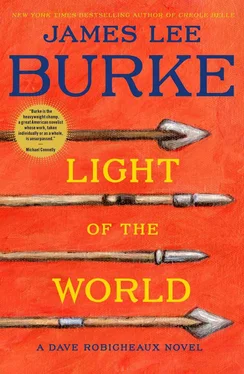“No. There’s a lot of riffraff around these days, that’s all. How about dinner? A nice place, maybe El Cazador if you like Mexican, or Romeo’s if you like Italian?”
There was a beat. “I need to take a shower and change.”
“So shower and change.”
“I’m at a motel on West Broadway.” She gave him the name. “Know where that is?”
“You’re staying there? That’s a shithole.”
“Tell me about it. Room nine. Give me a half hour. If I’m in the shower, the door will be unlocked.”
“You never asked my name.”
“You didn’t ask mine,” she said.
“What is it?” he asked.
“Trouble, with a capital T. You think you can handle it, Spider-Man?”
He slipped on his Ray-Bans. His incisors were white and pointy when he smiled. “I like the way you talk, mama. I promise you the ride of your life. Hey, I’m talking about on my Harley. Jesus, you’re touchy.”
That same evening, I tapped on Albert’s office door on the first floor in the back of the house, just past the glassed-in gun cabinets in the hallway. He kept an extraordinary collection of firearms and ordnance, most connected in some way to historical figures or events: several 1851 Navy Colt revolvers, many World War II rifles and handguns, a 1927 Thompson submachine gun with a fifty-round drum magazine, an 1873 Winchester, an AK-47 and an AR-15, disarmed hand grenades, shelves of .58-caliber minié balls and canister and grapeshot. Above his desk were other shelves stacked with bowie knives, glass telegraph transformers, Spanish wine bags, tomahawks, and framed collections of coins and Indian arrowheads and stone tools. Above his work desk, where he wrote both in longhand and on his computer, was a huge photograph of Woody Guthrie holding a guitar with THIS MACHINE KILLS FASCISTS painted on the soundboard.
He also kept a corkboard where he thumbtacked his collection of crank and hate mail, which he received with regularity, most of it written by racists throughout the United States. The centerpiece of the display, and my favorite, was a letter written by a prisoner on death row at Huntsville State Prison in Texas. The condemned prisoner’s mother had given him a copy of Albert’s last novel, narrated by a fictitious former Texas Ranger. The prison censor had expurgated so many passages that the text was unreadable. The inmate attached a copy of the censor’s justifications: Albert’s novel promoted racial divisiveness and a disrespect for authority.
“Am I bothering you?” I asked.
He was sitting at his desk, his reading glasses on, a dozen grade sheets spread before him. “No, come in, Dave,” he said, waving me in.
“What are you working on?”
“The general pain in the ass that made me quit teaching — fooling with grades and all that nonsense.”
“You’re retired. Why are you worrying about student grades now?”
“People I gave an incomplete to years ago finally end up doing the work and want credit for the course.”
I had known some of Albert’s students. They had told me about his method of teaching: He didn’t have one. His classes were chaos. Often he conducted them in a saloon or, if the weather was nice, on the lawn. He didn’t check the roll. He didn’t give grades for assignments. As a rule, he knew the students only by their first names. He told them to forget everything they had ever learned about literature and write about what they knew and remember that in art, there were no rules. The lowest grade he ever gave anyone who completed his creative writing workshop was a B. The only text he ever used was John Neihardt’s Black Elk Speaks . The only critic he ever respected was Wallace Stegner, not because Stegner was a scholar at Stanford but because he had been a Wobbly.
“Pack rats got into my file drawer. These grade sheets are useless,” he said. “I can’t find this guy’s name.”
I didn’t want to ask him how he never noticed that pack rats were living in his office. “What are you going to do?” I said.
“Well, I can’t give him an A because he turned the work in eleven years later. But he probably deserves at least a B, so that’s what he’s going to get.”
“I’m sorry for setting a fire in the cave,” I said.
“That’s all right. Your heart was in the right place. I just worry about you sometimes.”
Don’t buy into Albert’s doodah and get into it with him, I thought.
“There’s a lesson you never learned,” he said. “Do you remember the last line of dialogue Harry Morgan speaks in To Have and Have Not ?”
“Not offhand.”
“Harry is shot up real bad on his boat and dying and can hardly talk, and he says, ‘No matter how a man alone ain’t got no bloody fucking chance.’ ”
“You’re saying I’m a loner?”
“Inside you are. You have people around you, and they mean a lot to you, but inside you’re always by yourself.”
“You’ve been a loner since you were a kid,” I said.
“I’ve been alone since Opal died, but not before. Don’t ever make yourself alone, Dave. That’s the big lesson. When you start to see evil forces at work in the world, you give them power they don’t have.”
I was sitting in a leather swivel chair by his bookcases. I looked at my shoes and wasn’t sure what I should say. Albert had chain-ganged on the hard road in Florida. I didn’t want to talk down to him. But he made me mad. “I saw GIs who had been hanged in trees and skinned alive. I had a marine friend from Georgia, a sergeant, who went crazy with remorse over what he saw some other guys do to a Vietnamese girl in a ville they trashed. You want to know what they did?”
“No, I don’t.”
I told him anyway and saw him swallow and his eyes recede with a look of sorrow that would not go away easily. “You know that story to be true?” he asked.
“The guy who told it to me killed himself. Evil isn’t an abstraction,” I said.
“None of those things would have happened if we hadn’t taken on the neocolonial policies of the French and the British.”
“This isn’t politics. Asa Surrette is out there. He’s been on your property, and he tried to kill Alafair and Gretchen. How did he survive a head-on crash between a prison van and a tanker truck filled with gasoline?”
He shook his head. “I’m old, and I live by myself in a house where I hear my wife’s voice talking to me. Sometimes I think it’s my imagination, sometimes not. Sometimes I want to unlock my gun cabinet and join her. I don’t believe in the devil, and I don’t believe in Asa Surrette. The evil in our lives comes from men’s greed, and the manifestation of that greed is in the corporations that cause the wars.”
I loved Albert and felt bad for him. I hadn’t meant to hurt him or remind him of the loss of his wife or call up the feelings of loneliness and mortality that beset all of us when we live longer than perhaps we should. A window was open, and the wind was blowing strands of his white hair on his forehead. The evening was warm and the trees on the hillside were glowing in the sunset, and there was something about the moment that made me think of traditional America and lighted houses throughout the land and family people whose only goal was to lead good lives and be with one another. As I looked at Albert’s broad face and wide-set eyes and purposeful gaze, I thought of the ragtag army of Anglo-Scotch soldiers who formed up at Breed’s Hill outside Boston in 1775. I realized there was someone else Albert resembled, a man who was a collector of historical firearms and who represented everything Albert despised. I kept my opinion to myself and did not tell Albert how much he reminded me of Love Younger.
Читать дальше












